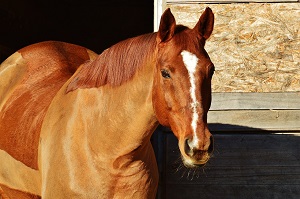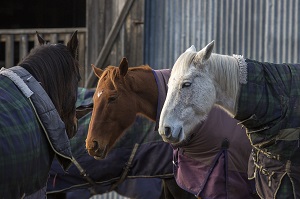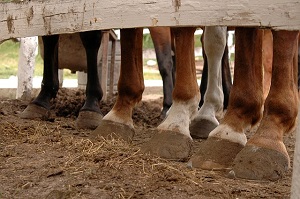Top Tips for Managing Your Horses Skin During Winter
-
Keep tack clean and clear from any scurfy skin or dried sweat. This will prevent any rubbing or sores developing in areas such as the girth.

-
Even if you have clipped your horse, ensure you sponge sweaty areas off after you have ridden. If it is cold, put a fleece or cooler on afterwards or (if you are lucky enough!) put your horse under a solarium or on a walker to keep warm.
-
Wash rugs regularly to prevent scurfy build up along high friction areas such as the shoulders, neck and croup area.
-
Don’t over rug your horse. Horses are designed to regulate their own temperature. Yes you may have to put a slightly thicker rug on those that are clipped, old or prone to losing weight. BUT causing your horse to over-heat by over-rugging can have a detrimental effect on their health and skin.
-
After you have clipped your horse, use warm water and a cloth with some soothing wash/coconut or baby oil, to remove any dirt and dust from the skin. Make sure you use two buckets (one to rinse the dirty cloth and the other to keep clean with your soothing ointment) to ensure your horse is sparkling! You may also need some clean towels to dry off any excess liquid!
-
Providing soothing washes, topical treatments and sprays can help to repair any cracked, dry or broken skin.

-
If your horse suffers from any skin related issues, you may want to consider providing immune support with a supplement through the winter. This can help your horse fight the challenges of winter from the inside out.
-
When washing legs be certain to use tepid water not cold water – this prevents such a shock to the skin and your horse!
-
Don’t wash legs every day if you can avoid it!
-
If you are going to wash legs ensure they have enough time to dry out fully. For horses with feathers or thick hair on their legs it can take a long time to dry fully and often the skin may remain damp for hours after the outer hair has dried. (A few clean old towels come in handy at this point!)
-
For our hairy legged friends, mites and lice can be real issue through the early winter months. Ensure you keep brushes clean, separate for each horse and if you suspect your horse may have mites or lice consult with your Vet to ensure an accurate treatment plan.
-
Apply oil onto dry and clean legs to deter any mud and moisture from the skin.

-
Ensure your horse has opportunity to stand on dry surface for a few hours per day. Especially if your horse lives out for the winter. This will give the horse’s skin and hair the chance to dry.
To discuss any of the points raised in this article, please speak to one of our Advisers via:
Telephone: 01453 836974
Email: advice@equifeast.com
